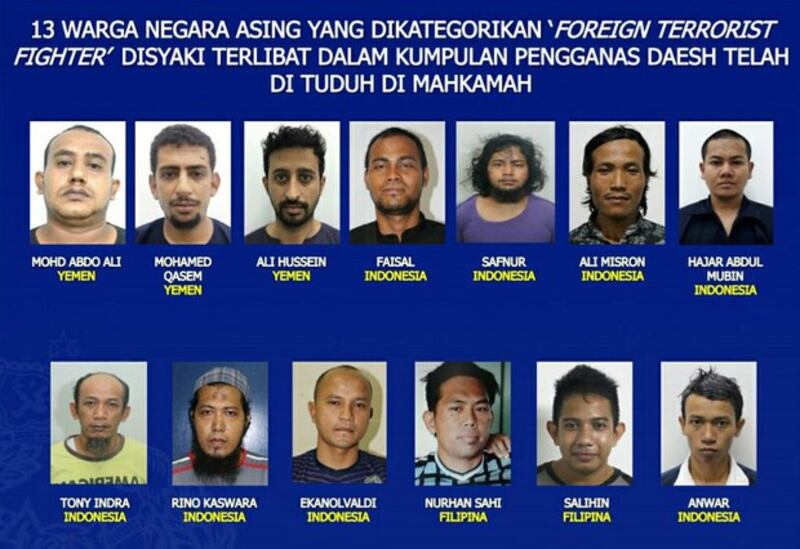Thai and Malaysian officials on Monday downplayed a Japanese warning of possible suicide bomb attacks in Southeast Asia, while Indonesia’s counter-terror police force said it would investigate.
Japan’s warning to its citizens came on the heels of a report by U.S.-based Site Intelligence Group, which monitors extremist communications online, that a pro-Islamic State militant group in Afghanistan had declared it was “time for war,” specifically in six Southeast Asian nations.
Normah Ishak, the chief of the Malaysian police’s counter-terrorism branch, said Japan’s warning was a routine one.
“There is no credible information of an imminent threat on our side. Our Japanese counterpart said this is normal practice to issue a general reminder on the anniversary of 9/11 and also the developments in Afghanistan,” Normah told BenarNews, referring to the Sept. 11, 2001, terror attacks in the United States.
“Malaysia’s security situation is under control and security forces remain vigilant.”
Malaysia’s foreign affair ministry said that Japan’s advisory had been shared with the relevant authorities in the country, “as we take this matter very seriously.”
Japan’s embassies in Kuala Lumpur and Bangkok urged their citizens residing in these nations to “strengthen their vigilance against terrorism” and take precautions.
“There is information that there is an increasing possibility that a suicide bomb attack will occur in places where many people gather, such as worship halls,” the advisory said.
“When it is unavoidable to visit a place that could be easily targeted by terrorism, pay attention to the surroundings, and if you detect anything suspicious, leave the place immediately.”
‘Routine warning’
Thailand confirmed that Japan’s foreign ministry had issued a warning to its citizens in the country. But Pol. Col. Krisana Pattanacharoen, a deputy spokesman for Thailand’s national police force, said there was no current intelligence about terror threats.
Japan’s advisory “could be a routine warning, but our security and special branch police said there is no sign of terrorist attacks yet,” Krisana said, adding, “We are staying alert.”
The Thai foreign ministry said that the Japanese embassy in Bangkok had no details about possible attacks.
“The Japanese MFA has not verified the source who fed it such information, while the embassy did not have more details,” Tanee Sangkrat, the foreign ministry spokesman told reporters.
“The Japanese MFA sent emails to all Japanese in this region, not only in Thailand.”
Media reports said the advisory was sent to a total of six Southeast Asian nations, including Indonesia, Myanmar, the Philippines and Singapore.
An official with Densus 88, Indonesia’s elite anti-terror police unit, said the agency would investigate Japan’s warning.
“We have not received an alert from any relevant institution. …We’re checking the information,” Densus 88 head of operations Aswin Siregar told BenarNews.
Threat report
In an Aug. 30 travel advisory, the United States warned that terrorists in Indonesia “may attack with little or no warning, targeting police stations, places of worship, hotels, bars, nightclubs, markets/shopping malls, and restaurants.”
And on Sept. 10, Site Intelligence Group said that a message in Malay posted on a pro-Islamic State (IS) platform urged lone wolves to attack non-Muslims and their religious gatherings and places of worship in East Asia. The message said fighters were ready to carry out suicide bombings in the region and in Afghanistan.
Site Intelligence said the writer of the message had the same name as an alleged deputy of the East Asia Mujahideen’s unit leader in Khorasan, an IS “province” in Afghanistan.
On Sept. 8, the writer had said on the same platform that it was “time for war” in Indonesia, Malaysia, Myanmar, the Philippines, Singapore and Thailand, the SITE report said.
“There are churches, temples, vihara [Buddhist temples], and Jewish community centers everywhere, and all of these can be blown up. All of those sites are [on] KAFIR soil.”
Kafir is an Arabic word that means infidel or a non-believer.
BenarNews contacted SITE Intelligence to request more information but didn’t immediately receive a reply.
A group known as the Islamic State Khorasan Province claimed responsibility for a suicide bomb attack at Kabul’s airport on Aug. 26 that killed about 170 civilians and 13 U.S. troops.

Thirteen suspected “foreign terrorist-fighters,” who were charged in Malaysian courts for alleged links to the Islamic State group, are seen in a photo released by Malaysian police, Oct. 13, 2017. [Courtesy of Royal Malaysian Police]
The Taliban factor
A Malaysian security analyst said that Japan’s warning was likely influenced by recent events in Afghanistan.
“Developments in Afghanistan when the Taliban gained power and a fear that the Taliban victory would inspire extremist groups, especially in Southeast Asia,” Ramli Dollah, an academic at Universiti Malaysia Sabah, told BenarNews.
Indonesian, Malaysian and Philippine officials had told BenarNews last month that the Taliban’s return to power could energize terror cells in Southeast Asian countries.
While pro-IS groups were significantly weakened, Southeast Asia's al-Qaeda affiliate had gained ground in recent years, Zachary Abuza, a professor at the National War College in Washington, wrote in a recent column for BenarNews.
“[J]emaah Islamiyah is waiting to pick up the pieces. It certainly has the financial resources to do so,” Abuza wrote.
Even before the Taliban takeover in Afghanistan, JI – which was responsible for the 2002 Bali bombings – was seeing a resurgence in Indonesia, Abuza told BenarNews last month.
“Afghanistan has always played a part in the development of terrorist networks in Southeast Asia.”
Nisha David in Kuala Lumpur, Tria Dianti in Jakarta and Marielle Lucenio in Manila contributed to this report.
